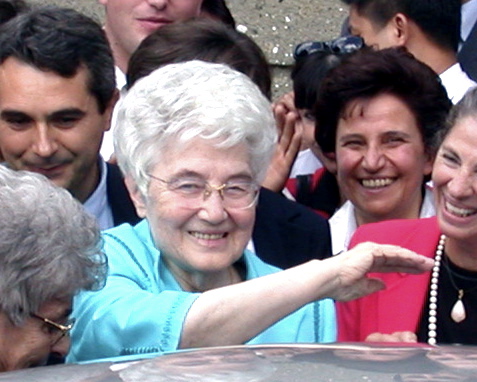
Chiara is an indispensable reference in these difficult times in which many Christians feel discouraged because they are a minority in the midst of a pluralistic and complex society that seems to live with its back to God.
These Christians feel abandoned and nostalgic for a past time, supposedly idyllic, which they have not lived. They are overcome by sadness and resemble the bent-over woman in the Gospel (Lk 13:10-17), unable to lift her head up to heaven. These Christians, in need of regaining their joy that Christ brings usIt would be good for them to deepen and meditate on the texts of Chiara, a woman always attentive to the inspirations of the Holy Spirit. She knew very well that the Christian's strength never ceases to be borrowed, for our weakness becomes strength in Christ.
One of my favorite texts by Chiara Lubich is an article written for the Zenit agency for Good Friday 2000. She was eighty years old at the time, although she could have written it at the beginning of her spiritual journey, for here we find one of the most characteristic features of her spirituality: meditation on Jesus forsaken.
In contrast to the expectations of those Christians attached to the supposed security lived in other times, Chiara presents the figure of a Christ stripped of his divinity on the cross in order to unite himself even more to man, to experience the anguish and helplessness of the human being at certain moments of his life. This is the meaning of the fourth word pronounced on the cross, "My God, my God, why have you forsaken me" (Mt 27:47).

I once read an explanation that did not convince me at all: Jesus had begun to pray a psalm containing these words and his exhaustion prevented him from continuing his prayer. It is possible that Jesus could have been praying that psalm, but it is certain that his words clearly express what he was feeling at that moment. For centuries insufficient attention has been paid to this fourth word, perhaps because some imagined it to be an unanswerable question.
Believers, on the other hand, know, as you recall ChiaraHe also points out that the Father resurrected and exalted his Son forever. In this regard, he further notes: "In Him, love was nullified, light was extinguished, wisdom was silenced. We were separated from the Father. It was necessary for the Son, in whom we all found ourselves, to taste separation from the Father. He had to experience God's abandonment so that we would no longer feel abandoned".
Chiara sees in this Jesus who cries out his abandonment many people who suffer physically, such as the blind, the mute or the deaf, but she also sees those who suffer in spirit: the disillusioned, the betrayed, the fearful, the timid, the disoriented... The latter are the wounded of life, an expression used on some occasions by St. John Paul II, and which I saw not long ago as the sign of a section in a bookstore in Lourdes. I think that those who are sick in spirit are much more numerous than the others, because in a society lacking in solidarity there are countless people who live in loneliness and helplessness.
In them Jesus is abandoned, for as Chiara says: "We can see him in every brother who suffers. By approaching those who resemble him, we can speak to them of Jesus forsaken.".
Sufferers have been sold the idea that their life is a failure and that nothing is worthwhile. But Jesus has suffered much more than all of them. Chiara reminds us that behind all the painful aspects of life there is the face of Christ. We could add that it is a concrete face with identity, even if it has very varied representations, and if his face is recognizable, so must be the face of our brothers and sisters because, as Chiara points out, each one of them is Him.
It is our task to transform pain into love, a task that humanly seems impossible, but it will be possible thanks to the strength and other gifts that the Spirit of Christ infuses us with..
John XXIII's idea of the Church as a sign and instrument of unity, which was the soul of the Second Vatican Council, was uniquely in tune with the charism of Chiara Lubich.
The evocation of the abandonment of Christ crucified leads me to relate Chiara to Olivier Clément, a well-known French Orthodox theologian. Both had a great admiration for Patriarch Athenagoras and had some personal meetings which they recorded in their writings. In the face of the political-social storms of the time, such as May '68, Athenagoras is not pessimistic or nostalgic for a supposedly better past, and assures Clément that these young protesters inspire him with compassion.
Although they do not realize it, they are completely abandoned young people and their cry is still a cry of orphans. The patriarch, a great expert in humanity, sees the student revolt as a call for help. For his part, Clément stresses that, despite the apparent triumph of nihilism, there is a great void in a protest movement that claims to be the heir of Marx, Nietzsche and Freud.
"Unlike the consumerist economy, based on a culture of having, the economy of communion is the economy of giving ...." Chiara Lubich.
They believe, like so many others, in the transformation of structures, or perhaps not even in that, although they do not realize that the only creative revolution in history is the one born from the transformation of hearts. For her part, Chiara Lubich, witness of a turbulent era in which Christ is once again abandoned and replaced by hopeless utopias, finds in Athenagoras the heart of a father, a youthful spirit full of faith and hope.
He does not describe him as a separated brother, a very frequent expression in the post-conciliar period, because he is convinced that he belongs to the same house, to the same family. This is authentic ecumenism, in which differences have lost their color thanks to the sun of charity. So much so that the cry of Jesus abandoned on the cross is necessarily addressed to all Christians without exception. The encounter with the abandoned Jesus, present in so many brothers and sisters whom we cannot leave alone, is a good example of ecumenism.
Antonio R. Rubio PloGraduate in History and Law. Writer and international analyst.
@blogculturayfe / @arubioplo